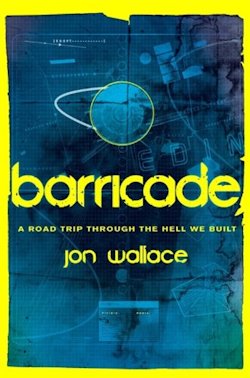Battlestar Galactica meets Mad Max in a dystopian debut that doesn’t disappoint: Jon Wallace’s Barricade is a bona fide barnstormer of a book about a dysfunctional future in which people are a problem our genetically engineered successors have almost solved.
In the first, the Ficials were created to help humanity. To do our dirty work—to serve and slave and slog and so on—thus they were bred to be better. Some have superhuman strength, others endless endurance; many are exceptionally intelligent, most are massively attractive. None of them have a heart, however. Pesky emotions would only have distracted them from their duties.
What could possibly have gone wrong?
Only everything. Years before Barricade begins, the Ficials struck back against their masters… but not out anger. Rather, reason:
“Control was built as an incorruptible arbiter, a trustworthy leader.”
“The thing is homicidal!”
“No, it is rational. It looked at the situation, concluded that it wasn’t possible to save both our race and the planet, and presented its case to the Engineered race. They were convinced by its logic and started the cull.”
The cull: a plan to solve the planet’s people problem, by ridding it of Reals completely. Brutal, to be sure, but brilliant in its simplicity. Sadly—for the Ficials, that is… if they had feelings, which they don’t—humanity had other ideas. Millions did die, but many of us survived, by hiding in the countryside whilst our stymied successors settled in the cities; by erecting great barricades to make life difficult for the Ficials.
Things have been at something of a standstill since; a sustained state of stalemate neither side is able to break. Not easily, at least. But there are those who dare to dream. Who dare, indeed, to drive. Kenstibec, a Ficial made to make—a construction model—has earned himself a reputation by chaperoning clients from city to city in that exact fashion.
Demand for his services is at an all time high at the outset of Jon Wallace’s novel. There’s just no other way for Ficials to get beyond the barricades:
Initially, after we first withdrew into the cities […] everybody tried to get about by flying, but this didn’t last long. The corrosives in the cloud barrier chewed up planes like gum. For a while you could fly beneath the clouds, nap-of-the-earth, but the Reals quickly mastered shooting them down.
A few salty dogs tried littoral operations. You could get a motor boat, hug the coastline and shoot upriver into London, Liverpool, Portsmouth—any of the bigger barricades—without too much trouble. But again the Reals got organised, manning all the city approached and creating their own ramshackle navies. All our big old navy ships lay corroding in port. There were still a few blockade runners, making use of the handful of small boats in Ficial hands, but not many. We’d pretty much lost the air and the sea.
This left the open road.
And that’s Kenstibec’s speciality:
Getting out of the city was never an easy task, and it couldn’t be approached lightly. There was a lot of planning involved and you needed to be careful. Many schools of thought existed about how best to do it, and I had plenty of arguments on the subject with other drivers. In my experience, nothing beat breaking out of the barricade in a high-powered 4×4 and running the gauntlet of siege positions until you reached the open countryside.
This is the kind of considered approach Kenstibec applies to most problems. He’s a blunt instrument, basically—more of a sledgehammer than a scalpel—but in his defence, he gets the job done, and that’s what matters… especially when it comes to the drive Wallace documents in his disarmingly direct debut. Starvie, a sexbot of sorts repurposed as a reporter in recent years, is Kenstibec’s precious cargo. His single-minded mission: to get her from Edinburgh to London alive.
It’s a run unlike any other, over the course of which Kenstibec will meet his maker, make an unexpected friend, cull humans by the hundreds, star in a television special, and bring the conflict between the Reals and the Ficials to a head… again.
For all that, Barricade’s story is fairly straightforward. We know where we’re going from the get-go, and though the author does take us on a detour or two, our destination isn’t difficult to determine. That said, the getting there is great. Wallace’s novel is fun from word one, packed with impactful action, and augmented by a brilliantly British—which is to say wicked—sense of humour.
In practice, the pace rarely relents, yet Barricade is ably punctuated. The larger part of the narrative is concerned with Kenstibec’s quest, but between chapters the author treats us to a gloss of the apocalypse. Whilst Wallace could have made much more of these moments, they get the job done decently, and as a means of providing periods of relief, they’re perfect, particularly considering that time to breathe is a valuable commodity in this novel.
As regards character, there are three. Kenstibec is the strong, silent type—cold if not calculating—and there’s more to Starvie than meets the eye. She’s something of a tragic character, however her perfect appearance—a rarity in the days of Barricade—does have a part to play. Last but not least, there’s the rotting Real our anti-hero forms a friendship with. That’s Fatty: a horrid human hostage who becomes something of a buddy. And that’s that. Unless you include the King of Newcastle. And who would?
Barricade is an easy debut to dismiss, initially, but don’t make that mistake. It’s a simple thing structurally, narratively and in terms of character—up to and including its blast from the past of a protagonist. Luckily, like Kenstibec, it’s also incredibly effective, and Jon Wallace, I warrant, is one to watch.
Barricade is available June 19th from Gollancz (UK).
Niall Alexander is an extra-curricular English teacher who reads and writes about all things weird and wonderful for The Speculative Scotsman, Strange Horizons, and Tor.com. He’s been known to tweet, twoo.










